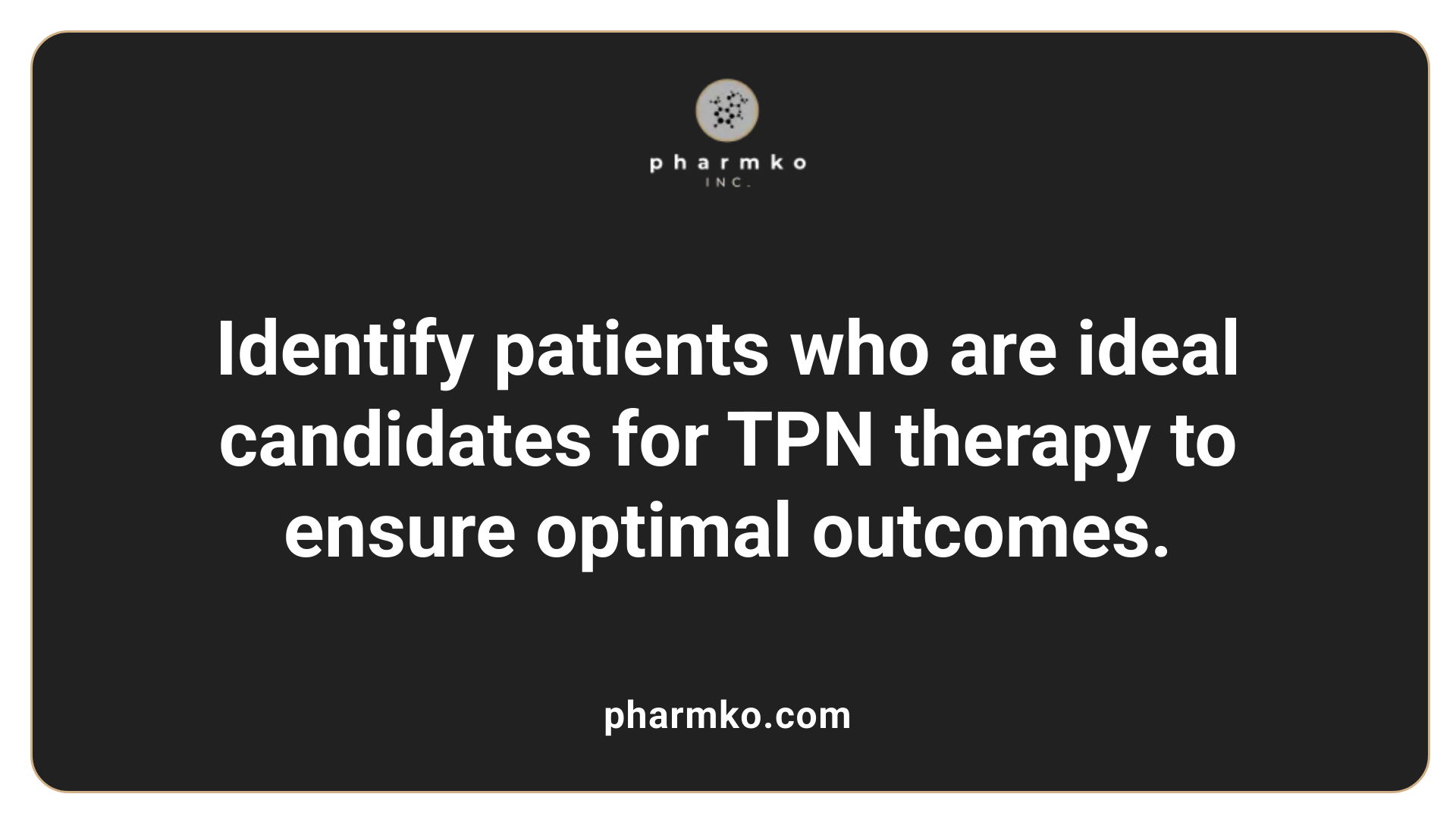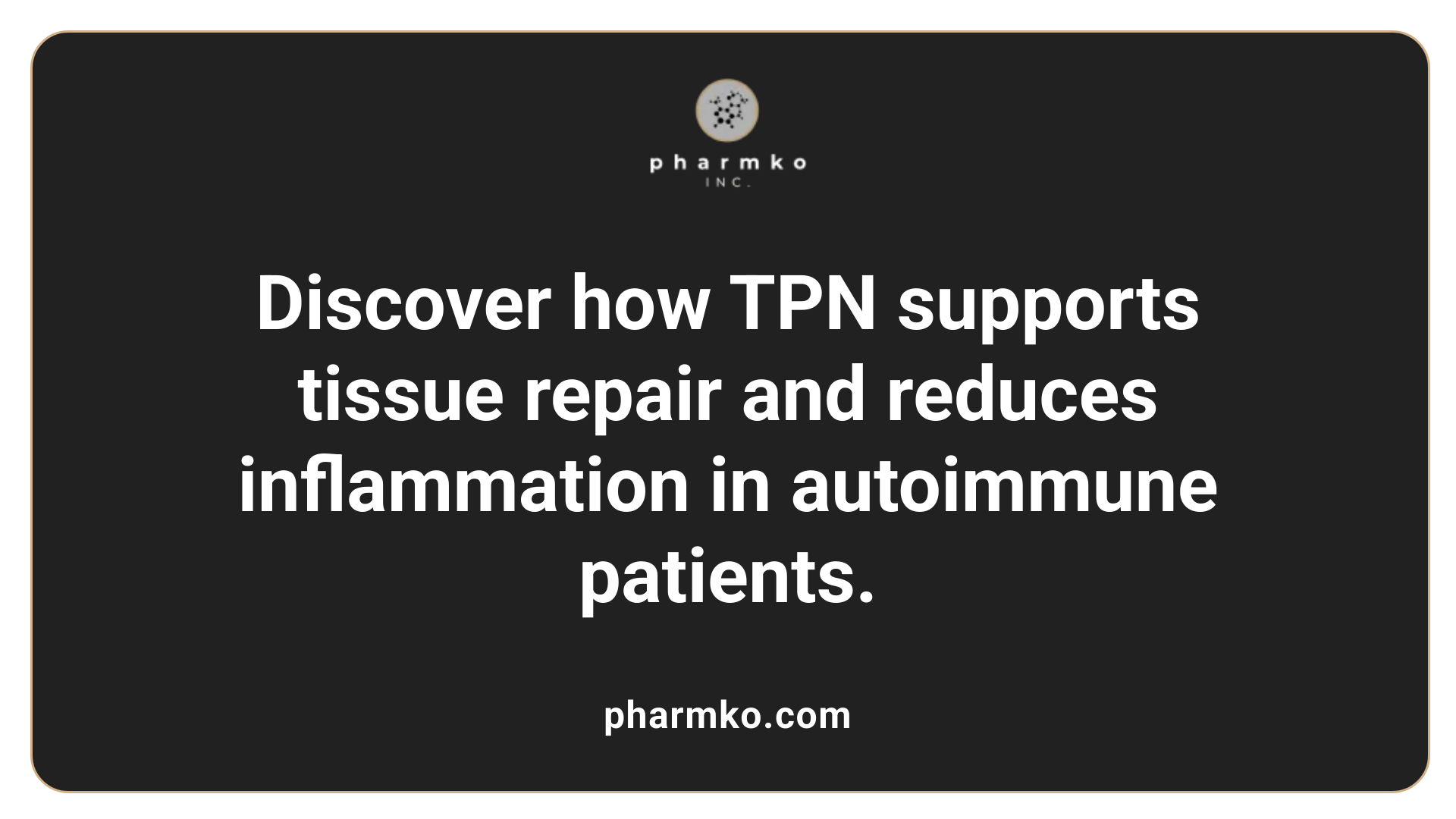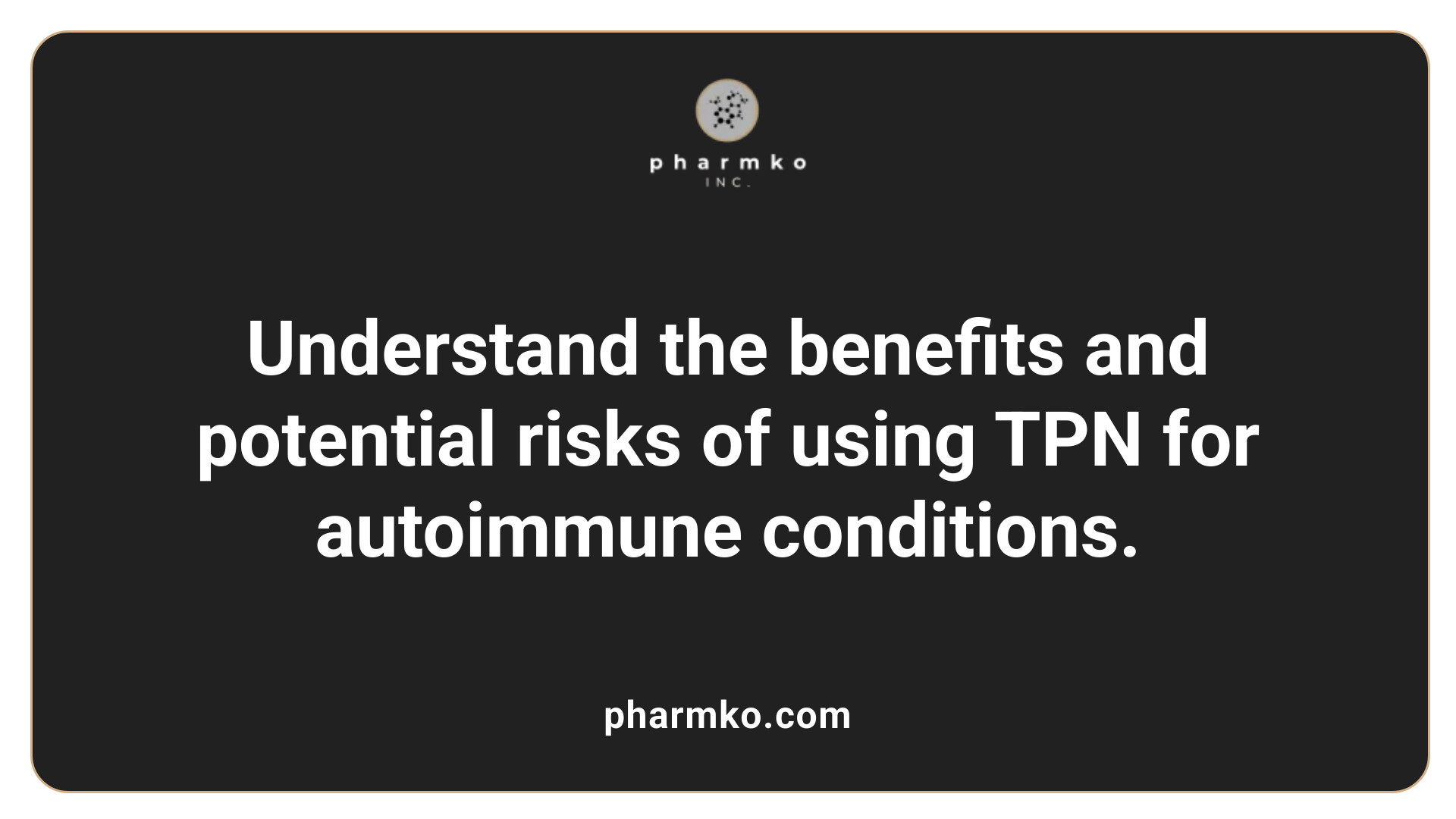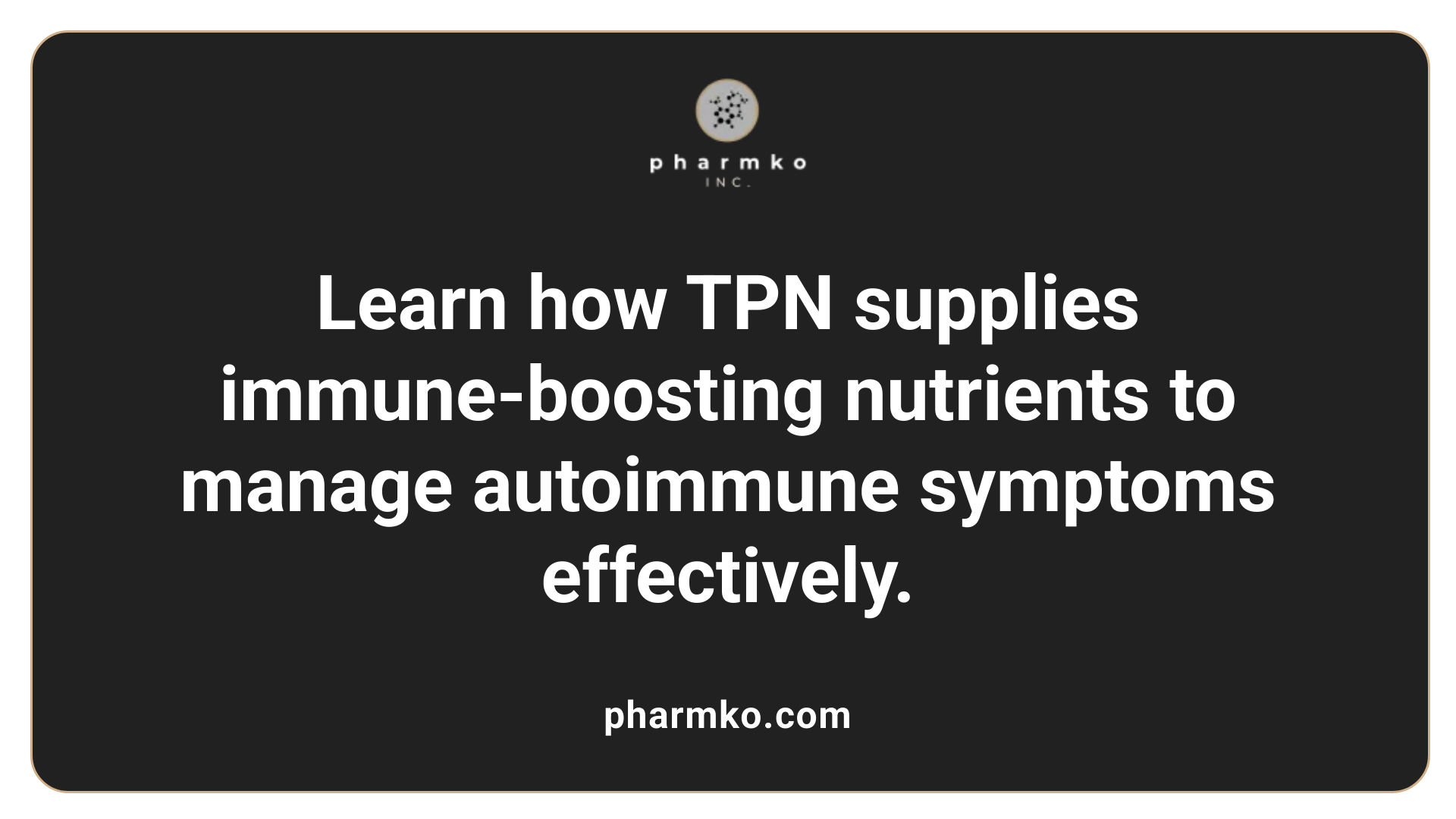The Benefits of TPN for Women with Autoimmune Conditions
Understanding TPN and Its Role in Autoimmune Disease Management
Total Parenteral Nutrition (TPN) is a vital therapeutic modality that delivers essential nutrients directly into the bloodstream, bypassing the gastrointestinal tract. For women with autoimmune conditions, where digestive absorption may be compromised, TPN can serve as a crucial intervention to sustain health, promote healing, and support immune function. This article explores the therapeutic benefits of TPN, its mechanisms, clinical indications, safety considerations, and how it can be integrated into comprehensive care for autoimmune diseases.
Who Can Benefit from TPN Therapy?

Who can benefit from TPN therapy?
Total parenteral nutrition (TPN) offers vital support for patients who cannot safely receive or absorb nutrition through their gastrointestinal (GI) tract. It is especially useful in conditions where the digestive system is severely impaired or non-functional.
Patients with complex GI issues such as bowel obstructions, fistulas, ischemia, or ongoing bleeding are prime candidates for TPN. These conditions prevent normal digestion and nutrient absorption, necessitating an alternative route for nutritional delivery.
In addition, individuals suffering from malabsorptive disorders—such as short bowel syndrome or prolonged ileus—may not be able to digest or absorb enough nutrients orally or through enteral feeding. TPN bypasses the GI tract and supplies essential nutrients directly into the bloodstream.
Critically ill, malnourished, or post-operative patients with high metabolic demands or systemic inflammatory responses are also candidates. When oral or enteral nutrition is not tolerated or feasible, TPN helps maintain adequate nutritional status, supporting recovery.
TPN formulations include a balanced mix of macronutrients—such as carbohydrates, lipids, and amino acids—and micronutrients like vitamins and electrolytes. This comprehensive nutrient delivery helps prevent malnutrition, promotes healing, and maintains energy levels.
Overall, TPN can be a life-saving intervention for those with significant gastrointestinal impairment or failure to maintain nutrition by conventional means. It ensures patients receive the vital nutrients needed for recovery, immune function, and overall health.
| Condition Category | Specific Conditions | Additional Details |
|---|---|---|
| Structural GI issues | Bowel obstructions, fistulas, ischemia, bleeding | Conditions preventing normal digestion or causing severe damage |
| Functional GI disorders | Short bowel syndrome, prolonged ileus | Disorders leading to malabsorption or intolerance to enteral feedings |
| Critical illnesses | Post-surgical recovery, systemic inflammatory response | High metabolic demands, inability to tolerate oral intake |
| Nutritional deficiencies | Severe malnutrition, autoimmune gastrointestinal diseases | Conditions requiring immediate nutritional support |
Providing TPN requires close monitoring and management by healthcare professionals to mitigate potential risks such as infections or metabolic imbalances. It can be administered in hospital settings or at home, with proper training ensuring safety and effectiveness.
Conditions Requiring TPN in Autoimmune Patients
What conditions may require TPN therapy?
Total parenteral nutrition (TPN) is a life-saving nutritional support used for patients who cannot meet their dietary needs through oral or enteral nutrition. It delivers essential nutrients directly into the bloodstream, bypassing the gastrointestinal (GI) tract.
In autoimmune patients, TPN is particularly valuable in several serious conditions. These include situations where the digestive system fails to function properly or is inaccessible for nutritional absorption.
One common reason for TPN use is post-surgical digestive failure, especially after extensive bowel resections. Such surgeries can lead to short bowel syndrome, where the remaining intestine isn't sufficient to absorb nutrients normally.
Severe malabsorption syndromes, like those seen in Crohn’s disease, also necessitate TPN. Crohn's can cause inflammation, fistulas, and damage to the intestines, impairing nutrient absorption and often requiring intravenous feeding.
Gastrointestinal obstructions, fistulas, ileus, and GI ischemia are additional indications. Obstructions block food passage, while fistulas and ileus prevent proper absorption. Ischemia, or reduced blood flow to the intestines, can cause tissue damage, demanding nutritional support via TPN.
Radiation enteritis, a side effect of cancer treatments, and severe diarrhea or vomiting also impair nutrient intake and absorption. Patients with these conditions often need TPN to maintain energy and nutrient levels.
Furthermore, in critical cases such as sepsis, major trauma, or extensive burns, the metabolic demands of the body increase dramatically. These hypermetabolic states can prevent adequate nutrition via the GI tract, making TPN essential for recovery.
Overall, TPN is indicated in autoimmune and other complex conditions where the gut cannot fulfill its role for extended periods. It is usually considered when other nutritional routes are contraindicated or insufficient, especially when non-function persists beyond 7-10 days.
This therapy ensures that patients receive necessary macronutrients—carbohydrates, proteins, lipids—and micronutrients, supporting healing and preventing malnutrition. Proper management and monitoring are critical to minimize complications and optimize patient outcomes.
| Condition | Description | Typical Use in Autoimmune Patients |
|---|---|---|
| Short Bowel Syndrome | Post-resection state | Post-surgical recovery, severe malabsorption |
| Severe Malabsorption (e.g., Crohn's) | Damage to intestinal lining | Autoimmune-induced intestinal damage |
| GI Obstructions & Fistulas | Blocked or abnormal connections | Fistulas causing high output, obstruction cases |
| Ileus & Ischemia | Paralysis of bowel or blood supply issues | Post-surgical or inflammatory causes |
| Radiation Enteritis | Damage from radiation therapy | In cases of GI inflammation from treatments |
| Severe Diarrhea & Vomiting | Result of infections or autoimmune activity | To provide nutrition when oral intake isn’t possible |
| Critical Conditions | Sepsis, trauma, burns | When hypermetabolism hampers nutrition absorption |
By understanding these conditions, healthcare providers can tailor TPN therapy to support autoimmune patients effectively, ensuring they maintain proper nutrition during critical times.
Ingredients, Administration, and Safety of TPN in Autoimmune Care
What are the ingredients, administration process, and safety considerations for TPN relevant to individuals with autoimmune conditions?
Total parenteral nutrition (TPN) is an advanced form of intravenous feeding designed to provide essential nutrients directly into the bloodstream. It is particularly beneficial for individuals with autoimmune conditions who may have compromised gastrointestinal function or heightened nutritional needs.
The formulation of TPN includes a range of specialized components tailored to each patient's unique health profile. These components encompass amino acids (protein building blocks), dextrose (a form of glucose for energy), lipids (fats that supply essential fatty acids and calories), vitamins, electrolytes (such as sodium, potassium, and chloride), minerals, and trace elements like zinc, selenium, and copper. This comprehensive mixture ensures the patient receives a balanced supply of nutrients critical for maintaining immune function, tissue repair, and overall health.
In practice, TPN is typically administered via a central venous access, such as peripherally inserted central catheters (PICCs) or other central lines, due to the hypertonic nature of the solution. For some cases, peripheral parenteral nutrition (PPN) can be used with lower concentrations of nutrients, though it is less common for long-term therapy.
The preparation of TPN is performed by healthcare professionals in a sterile environment, often using “3-in-1” admixtures that combine lipid emulsions with amino acids and dextrose, or through multi-chamber bags that keep components separate until administration. This process minimizes contamination risk and ensures precise dosing.
Safety considerations are vital, especially for patients with autoimmune conditions. These individuals often have suppressed immune systems or are on immunosuppressive therapies, making infection prevention paramount. Strict aseptic techniques and rigorous infection control protocols during catheter handling are necessary to reduce the risk of bloodstream infections.
Monitoring is an ongoing process. Healthcare teams regularly check blood glucose levels, electrolytes, liver function tests, and triglyceride levels to detect and correct imbalances promptly. Adjustments to the formulation are made based on dynamic patient needs, nutritional goals, and laboratory results.
Autoimmune patients may face unique risks, including liver toxicity from long-term TPN use, nutrient imbalances, or metabolic disturbances. Therefore, an interdisciplinary team—including physicians, pharmacists, dietitians, and nurses—collaborates to optimize therapy. They ensure that the formulation remains safe and effective while matching the patient’s evolving condition.
In summary, TPN components are carefully selected and administered with attention to safety, especially for individuals with autoimmune diseases. Proper technique, vigilant monitoring, and personalized adjustments help maximize benefits while minimizing risks associated with this lifesaving nutrition support.
Enhancing Healing Processes Through TPN

How does TPN support tissue repair and reduce inflammation?
Total Parenteral Nutrition (TPN) supplies essential nutrients directly into the bloodstream, bypassing the gastrointestinal tract when necessary. This method allows for precise control of nutrient intake, which is vital for patients who cannot eat or absorb food normally. TPN contains macronutrients such as amino acids, carbohydrates, and lipids, along with micronutrients including vitamins and minerals.
Certain nutrients included in TPN formulations play supportive roles in reducing inflammation and fostering tissue repair. Omega-3 fatty acids, found in some lipid emulsions, are known for their anti-inflammatory properties. They can help modulate immune responses and decrease systemic inflammation, which is particularly beneficial in autoimmune conditions.
Antioxidants like vitamins C and E, along with trace elements such as zinc and selenium, combat oxidative stress that damages cells and tissues, promoting healing processes. Amino acids, especially glutamine and arginine, are crucial for the synthesis of proteins needed for wound healing, immune function, and tissue regeneration. They influence cytokine production and immune cell activity, which are key in reducing inflammation and supporting recovery.
Can TPN support immune function and healing in autoimmune patients?
In autoimmune diseases, the immune system mistakenly attacks the body's own tissues, leading to chronic inflammation. Proper nutrition plays a significant role in modulating immune responses, and TPN can help supply the nutrients necessary to maintain immune competence.
Amino acids are particularly important because they regulate immune cell activation, including T lymphocytes, B lymphocytes, natural killer cells, and macrophages. Supplementing amino acids like arginine and glutamine strengthens immune defenses and may reduce the severity or progression of autoimmune responses.
Moreover, antioxidants and omega-3 fatty acids included in some TPN formulations can help control inflammation, potentially alleviating symptoms and supporting tissue repair. Adequate micronutrient levels—such as vitamins D and E—further promote immune regulation.
While TPN primarily supports patients with severe gut dysfunction, its comprehensive nutritional provision can confer benefits that help manage autoimmune conditions by improving overall health and reducing inflammation.
Limitations and considerations in autoimmune contexts
Despite its potential benefits, the use of TPN in autoimmune conditions must be carefully considered. Long-term TPN has been associated with hepatobiliary and bone diseases, as well as metabolic complications like electrolyte imbalances and infections.
In patients with autoimmune diseases, it is essential to tailor the formulation to avoid exacerbating inflammation. For example, limiting foods or nutrients that may trigger immune responses—such as certain additives or gluten—can be beneficial.
Monitoring is crucial to ensure that nutrient levels remain balanced and that immune responses are not inadvertently stimulated. Excessive or insufficient supplementation of nutrients like amino acids or antioxidants could potentially alter disease activity.
Therefore, TPN should be administered under careful medical supervision, with ongoing assessment of immune status, nutritional adequacy, and potential adverse effects.
Nutritional strategies and their impact on autoimmune disease management
Dietary approaches complement TPN by including foods rich in anti-inflammatory compounds—such as fatty fish, berries, and leafy greens—and avoiding known triggers like gluten or excessive sugar.
Integrating specific nutrients through both diet and supplementation can stabilize immune function and reduce inflammation. For instance, omega-3 fatty acids, probiotics, and vitamin D have shown promise in supporting immune health.
Lifestyle factors like stress reduction, regular exercise, and adequate sleep further enhance immune regulation. These strategies, combined with tailored nutritional support such as TPN, can help manage autoimmune disease symptoms and improve healing.
| Aspect | Consideration | Supporting Details |
|---|---|---|
| Nutrients in TPN | Support inflammation reduction | Omega-3 fatty acids, antioxidants, amino acids |
| Immune support | Enhances immune cell function | Amino acids regulate lymphocytes, macrophages |
| Healing | Promotes tissue repair | Adequate protein, vitamin, mineral levels |
| Limitations | Potential for complications | Liver disease, infections, metabolic imbalances |
| Diet strategies | Reduce triggers, include anti-inflammatory foods | Gluten-free, low sugar, rich in omega-3s |
Through strategic use of TPN and supportive dietary choices, patients with autoimmune diseases can experience improved healing, reduced inflammation, and better overall health outcomes.
Advantages and Risks of TPN in Autoimmune Management

What are the potential advantages and risks associated with TPN use for autoimmune disease management?
Total parenteral nutrition (TPN) provides a vital route for delivering nutrients directly into the bloodstream, bypassing the gastrointestinal (GI) tract. This method is especially advantageous for patients with autoimmune diseases that severely impair intestinal function or lead to malabsorption. In such cases, TPN helps support their nutritional and immune health, which is critical for maintaining overall well-being.
One of the main benefits of TPN is its ability to serve as a lifesaving intervention. Patients suffering from autoimmune conditions like autoimmune enteropathy or severe gastrointestinal damage often cannot absorb nutrients via oral or enteral routes. TPN allows these patients to receive essential macronutrients—fats, proteins, carbohydrates—and micronutrients—vitamins, minerals, electrolytes—directly into their bloodstream. This can help sustain their energy levels, promote healing, and support immune responses, thereby preventing malnutrition and its related complications.
Moreover, TPN's precise control over nutrient delivery makes it highly beneficial in clinical scenarios requiring tailored nutrition, such as during severe flare-ups of autoimmune diseases or after major surgeries. It facilitates recovery by ensuring patients receive necessary nutrients without exacerbating their condition.
However, these significant benefits come with notable risks. The most common complications involve infections, especially related to catheter use. Catheter-related bloodstream infections pose serious health threats if not promptly identified and managed. Blood glucose abnormalities, such as hyperglycemia, are also common due to high dextrose content in TPN formulations, requiring close monitoring.
Long-term TPN use can lead to seriou complications, including liver dysfunction—often called parenteral nutrition–associated liver disease—and mineral imbalances that promote osteoporosis or gallstone formation. Hepatobiliary and bone diseases are particularly concerning with prolonged therapy, emphasizing the need for regular monitoring.
Furthermore, metabolic complications like fatty liver, electrolyte imbalances, and refeeding syndrome pose additional risks, especially during initial administration or rapid initiation of TPN.
Effective management of these risks involves careful patient selection, vigilant monitoring of blood parameters like serum glucose, electrolytes, triglycerides, and liver enzymes, and adjusting the nutrient formulations as needed. Proper sterile techniques and vigilant vascular access care are essential to prevent infections.
In summary, while TPN can be a critical tool for managing severe autoimmune-related gastrointestinal impairment, its associated risks necessitate careful use. A multidisciplinary approach, encompassing close clinical and laboratory monitoring, optimized formulations, and infection control practices, can maximize therapeutic benefits while safeguarding patient health.
Nutritional Support and Immune Modulation in Autoimmune Conditions

How does TPN support immune health and manage autoimmune symptoms?
Total Parenteral Nutrition (TPN) plays a vital role in maintaining immune health, especially for patients with autoimmune conditions who cannot obtain sufficient nutrients through oral intake. A deficiency in dietary proteins or amino acids impairs immune function, making individuals more vulnerable to infections and disease progression.
Amino acids such as arginine, glutamine, and cysteine are essential in regulating immune responses. Arginine, for example, activates T lymphocytes, B lymphocytes, natural killer cells, and macrophages—all crucial immune system components. Supplementing these amino acids through TPN or other means enhances immune competence, reduces the risk of infections, and can lower morbidity and mortality.
Furthermore, plant-based nutrients like omega-3 fatty acids, vitamin D, and antioxidants contribute significantly to reducing inflammation and supporting immune regulation. Omega-3 fatty acids, found in fatty fish, flaxseeds, and walnuts, possess anti-inflammatory properties and help balance immune responses.
Proper nutritional support via TPN not only provides necessary macronutrients and micronutrients but also helps mitigate systemic inflammation often seen in autoimmune diseases. This approach can preserve immune system functionality, modulate inflammatory pathways, and may decrease the severity of symptoms.
By ensuring adequate intake of key nutrients, TPN supports immune resilience and can be a part of comprehensive autoimmune disease management. Such nutritional strategies help in reducing disease activity, improving overall health, and potentially aiding in better symptom control.
Role of diet and supplements—Vitamin D, omega-3, antioxidants—in reducing inflammation and modulating immune responses
Dietary choices and targeted supplementation are central to managing inflammation and supporting immune health. Vitamin D, for instance, has immunomodulatory effects that enhance the pathogen-fighting abilities of immune cells and regulate inflammatory responses.
Omega-3 fatty acids, abundant in fatty fish, flaxseeds, and walnuts, are known for their role in reducing inflammatory cytokines and promoting resolution of inflammation.
Antioxidants found in fruits and vegetables, such as vitamins C and E, help neutralize oxidative stress, which is often elevated in autoimmune conditions. This reduction in oxidative damage can decrease tissue injury and disease activity.
Supportive foods and supplements may include turmeric (curcumin), probiotics, and other anti-inflammatory agents. It's important, however, that such interventions are guided by healthcare professionals to prevent interactions and ensure appropriate dosing.
Impact of proper nutrition on disease activity and symptom management
Maintaining optimal nutritional status is crucial in managing autoimmune diseases. Adequate intake of proteins, healthy fats, vitamins, and minerals can reduce disease flare-ups, lessen fatigue, and improve overall well-being.
Proper nutrition contributes to balanced immune responses, lessens systemic inflammation, and supports tissue repair. Conversely, nutritional deficiencies may exacerbate symptoms, impair healing, and increase susceptibility to infections.
Tailored nutritional plans, including the use of TPN in severe cases, can stabilize disease activity, improve response to therapies, and enhance quality of life. Early nutritional intervention and continuous monitoring are recommended to adapt dietary strategies and optimize health outcomes.
| Aspect | Nutritional Strategy | Benefit | Additional Notes |
|---|---|---|---|
| Immune support | Amino acids (arginine, glutamine, cysteine) | Enhance immune cell function | Via TPN or supplementation |
| Inflammation reduction | Omega-3 fatty acids | Decrease cytokine production | Incorporate in diet or supplements |
| Inflammatory control | Vitamin D | Modulate immune response | Supplementation under medical guidance |
| Oxidative stress | Antioxidants (vitamins C, E) | Reduce tissue damage | Encourage fruit and vegetable intake |
| Gut health | Probiotics | Improve immune regulation | Yogurt, kefir, fermented foods |
This comprehensive approach underscores the importance of tailored nutrition, including potential use of TPN, in managing autoimmune conditions. Access to precise and monitored nutritional interventions can significantly impact disease progression and patient quality of life.
Dietary and Lifestyle Strategies to Complement TPN in Autoimmune Disease Management
What dietary approaches can support TPN treatment and autoimmune disease control?
Nutrition plays a vital role in managing autoimmune diseases, especially when patients rely on Total Parenteral Nutrition (TPN). Supporting TPN therapy with targeted dietary strategies can help modulate inflammation and strengthen immune function.
One effective approach is adopting anti-inflammatory diets. These diets emphasize foods rich in omega-3 fatty acids, antioxidants, and healthy fats, which can help reduce systemic inflammation.
Key dietary patterns include:
- The Mediterranean diet , known for its high intake of fruits, vegetables, whole grains, nuts, olive oil, and fatty fish.
- The Autoimmune Protocol (AIP) , which focuses on eliminating foods that may trigger immune responses, such as grains, beans, nightshades, and processed foods.
- Gluten-free diets , especially vital if individuals have celiac disease or gluten sensitivity that exacerbates autoimmune symptoms.
Foods with anti-inflammatory properties
Incorporating specific foods can enhance immune regulation and reduce inflammation:
| Food Category | Examples | Benefits |
|---|---|---|
| Fatty fish | Salmon, mackerel, sardines | Rich in omega-3 fatty acids, which decrease inflammation |
| Berries | Blueberries, strawberries, raspberries | Packed with antioxidants to combat oxidative stress |
| Leafy greens | Spinach, kale, Swiss chard | High in vitamins and anti-inflammatory compounds |
| Nuts and seeds | Walnuts, flaxseeds, chia seeds | Provide healthy fats and anti-inflammatory nutrients |
| Olive oil | Extra virgin olive oil | Contains monounsaturated fats and antioxidants |
| Turmeric | Spices and supplements | Contains curcumin, a potent anti-inflammatory compound |
Supporting gut health
Probiotics, found in fermented foods like yogurt and kefir, support the gut microbiome. A healthy gut is crucial for immune system regulation, especially in autoimmune conditions. Maintaining gut integrity can reduce immune dysregulation and inflammation.
Food sensitivities and triggers
Some individuals find relief by avoiding foods that can worsen autoimmune symptoms, such as:
- Gluten
- Dairy
- Soy
- Nightshade vegetables (e.g., eggplant, tomatoes, peppers)
Eliminating or reducing these foods may help control flare-ups and improve overall well-being.
Lifestyle factors
Beyond diet, lifestyle modifications significantly impact autoimmune disease management. Strategies include:
- Stress management : Practices like meditation, yoga, or deep-breathing exercises.
- Regular physical activity : Moderate exercise supports immune health.
- Adequate sleep : Ensures proper immune recovery.
- Avoidance of smoking and excessive alcohol consumption : Reduces inflammation and supports tissue repair.
Integrating diet and lifestyle for optimal outcomes
Combining nutritional strategies with healthy lifestyle choices can amplify the benefits of TPN therapy. These approaches work together to modulate immune responses, reduce chronic inflammation, and improve quality of life.
By tailoring these strategies to individual needs and consulting healthcare professionals, patients can better manage autoimmune symptoms, enhance the effectiveness of TPN, and support overall health.
Future Perspectives and Research Directions in TPN for Autoimmune Care

What is the future outlook for TPN use in autoimmune disease treatment?
The future of Total Parenteral Nutrition (TPN) in managing autoimmune diseases is promising, with ongoing research shaping its evolving role. Advances aim to deepen our understanding of how TPN can support immune regulation and reduce disease activity.
One significant trend is the development of personalized nutrition strategies. By tailoring nutrient formulations based on an individual’s immune profile, disease state, and metabolic needs, healthcare providers can optimize therapeutic outcomes. This approach promises to enhance immune function, reduce inflammation, and improve quality of life.
Innovations in TPN formulation and delivery are also on the horizon. New biocompatible additives and advanced delivery systems aim to minimize complications such as infections, liver dysfunction, and nutrient imbalances. These improvements might facilitate longer-term therapies, which are often necessary in chronic autoimmune conditions.
Clinical trials are essential for establishing clear guidelines and evaluating the comparative effectiveness of TPN in different autoimmune diseases. Future research should focus on identifying specific biomarkers that predict responses to TPN and help personalize treatments.
Overall, TPN is expected to become more integrated into comprehensive autoimmune disease management plans. Its role may extend beyond nutrition support to include immunomodulation and inflammation reduction, ultimately improving patient outcomes and quality of life.
Potential for personalized nutrition strategies
Personalized nutrition for autoimmune health involves customizing nutrient delivery to target individual immune responses. Genetic, metabolic, and clinical data will inform choices of macro- and micronutrients. For example, adjusting amino acid content to support immune cell function or including anti-inflammatory fatty acids like omega-3s could provide tailored therapeutic benefits.
Innovations in TPN formulation and administration technologies
Emerging technologies include multi-chamber bags with pre-measured nutrient compartments, improving stability and convenience. Improvements in infusion pump precision and sterile handling will reduce infection risks. Researchers are also exploring biocompatible, biodegradable delivery systems that can adapt to long-term use.
These advancements promise safer, more effective TPN therapies, especially vital for patients requiring prolonged nutritional support due to autoimmune or other complex conditions.
| Topic | Focus Area | Impact |
|---|---|---|
| Personalized Nutrition | Immune-profile tailored formulas | Optimized immune modulation |
| Formulation Innovations | Biocompatible additives, stability | Reduced complications, longer therapy |
| Delivery Technologies | Advanced infusion systems | Increased safety, convenience |
As research continues, the integration of these innovations holds the potential to revolutionize TPN use in autoimmune care, making therapies more effective, personalized, and safer.
Harnessing Nutrition for Autoimmune Wellness
Incorporating TPN into the management of autoimmune conditions offers promising avenues for supporting nutritional status, immune health, and overall recovery. While it carries certain risks that require vigilant monitoring, its capacity to deliver tailored nutrition directly into the bloodstream makes it a vital option for women facing gastrointestinal limitations. As research advances and personalized approaches emerge, TPN is poised to become an integral part of holistic autoimmune care—enhancing healing, stability, and quality of life for those affected by these complex diseases.
References
- A Complete Guide to TPN Therapy - AmeriPharma® Specialty Care
- Parenteral Nutrition Overview - PMC - PubMed Central
- Understanding the Benefits of Total Parenteral Nutrition - AvevoRX
- Amino acids and immune function - Cambridge University Press
- The Role of Nutrition in Managing Autoimmune Diseases
- TPN for Cancer Patients - AmeriPharma® Specialty Care
- The Benefits of Plant-Based Nutrition: for Enteral Nutrition
- Total Parenteral Nutrition - StatPearls - NCBI Bookshelf
- Parenteral Nutrition: What it Is, Uses & Types - Cleveland Clinic
- Parenteral Nutrition Overview - PMC - PubMed Central













